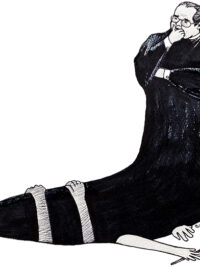Maus in Tennessee: A Censor’s Tale
What’s the matter with Tennessee? To an observer, it looks like the Volunteer State has something in the water making its public officials anti-comics. In the 1950s, Tennessee’s Senator Estes Kefauver chaired the Senate Subcommittee on Juvenile Delinquency which investigated the comic industry. Kefauver, who had previously led a Senate investigation into organized crime, was likely seeking an issue to promote in his planned 1956 Presidential run. For non-comics fans or those otherwise unaware, Kefauver’s star witness, Dr. Frederic Wertham proclaimed to the Senate that “Hitler was a beginner compared to the comic book industry.” While his investigation severely damaged comics, leading to the loss of jobs, the bankruptcy of several publishers, and the virtual elimination of the crime and horror genres, it didn’t do much for his political ambitions. First, he was stuck in the Vice Presidential spot supporting Adlai Stevenson and second, the Stevenson/Kefauver ticket was buried in November by the millions of voters who still liked Ike.

On the surface Kefauver and the elected officials of the McMinn County School Board have little in common. Kefauver was a New Deal Democrat while McMinn County has long been a Republican Party stronghold. Although the race for School Board is officially non-partisan, given the overwhelmingly GOP slant of the county it’s likely that the Board shares the broad ideology and goals of the Republican Party. What the two have in common is their desire to prevent children from reading certain comics. While Kefauver’s committee was focused on crime and horror comics, the McMinn County School Board went after Art Spiegelman’s biography of his father, a Holocaust survivor, Maus.
When I was first reading comics, Maus had already been canonized and sanctified. At my public library, it was not shelved with the other comics, the Batmans and Spider-Mans. No, it was shelved with the classics, as befits its Pulitzer Prize winning stature. As such, it was a surprise to me when McMinn County schools removed the book from their curriculum on January 10, 2022, a day before International Holocaust Remembrance Day. I was keeping up with the efforts to ban books, including comics, with LGBTQ or anti-racist themes but I thought that the acclaim and longevity of Maus would have shielded the title from this backlash. Obviously, this belief was incorrect.
Thanks to the Comics Journal readers can see the transcript of the School Board meeting that decided to remove Maus from the curriculum themselves. The transcripts are not flattering to either the elected officials or the voters that put them there. Board member Tony Allman comes off particularly poorly. He complains that of Maus that “It shows people hanging, it shows them killing kids, why does the educational system promote this kind of stuff, it is not wise or healthy.” It’s not a good sign for Allman’s reading comprehension if he thinks that Maus, by depicting the Holocaust, is somehow promoting the cause of Nazism. It also begs the question of how Allman thinks the Holocaust, the mass murder of millions of people, can be taught without referencing the horrific violence that occurred.
This confusion between depicting violence and endorsement of said violence is another commonality with the 1950s anti-comics crusade. While testifying before the Senate, Frederic Wertham ripped into the story “the Whipping” from EC Comics’ Shock SuspenStories. Wertham objected to the story’s use of racial slurs and the violence committed by racist vigilantes. However, “the Whipping” was actually a story with an anti-bigotry message. Wertham either didn’t know this or did know and argued that the story was racist in order to bolster his anti-comics argument.
Allman also takes issue with Spiegelman’s previous illustrative work for Playboy saying “this guy that created the artwork used to do the graphics for Playboy. You can look at his history, and we’re letting him do graphics in books for students in elementary school. If I had a child in the eighth grade, this ain’t happening.” Allman here forgets that the meeting is about the 8th grade English Language Arts curriculum, not elementary school. He draws a connection between Playboy and Maus where none exists and implies that because Spiegelman worked for Playboy his illustrations in Maus are somehow pornographic. Any reader of Maus knows that this is far from the truth. There is one brief image of female nudity in a scene depicting the suicide of Spiegelman’s mother and it is not titillating or arousing in any way.
A disturbing quote comes from School Board member Rob Shamblin who said “It’s banned many places in Europe because of how critical it is against the heinous acts that were done.” First, Shamblin’s statement is false. A Polish translation of Maus was delayed until 2001 due to concerns over the depiction of Poles and Putin’s Russia (that bastion of freedom) banned the book in 2015 because it has a swastika on the cover. Neither of these incidents have anything to do with the book’s depictions of the Holocaust. Second, why does Shamblin think it is wrong to educate children on the horror’s of Nazism? Shamblin’s comment reminds one of the U.S. Senate’s bumbling investigation of anti-Nazi films like The Great Dictator and Confesssions of a Nazi Spy as “war mongering” propaganda, as though there’s something distasteful about being anti-Hitler.
Continuing on this opposition to anti-Nazi literature, the banning of Maus at this time feels like a form of intellectual disarmament. At a time when Nazis feel free to march in the streets and elected officials meet with white supremacists and Holocaust deniers it is vital that people have a full understanding of what Nazis have done and will do in power. To teach a cleaned up, sanitized Holocaust is not just a disservice to those who died, it is dangerous given current events.
Since McMinn County Schools banned Maus, interest in the title has soared and many have donated copies of the book to the local library. However, record numbers of book bans are being pushed in school and public libraries according to the American Library Association. While no other institution has banned Maus yet, this does not mean that those of us devoted readers who believe in the freedom of our citizens to read can relax. In the words of Art Spiegelman “Keep your nose in a book-and keep other people’s noses out of which books you choose to stick your nose into!”

